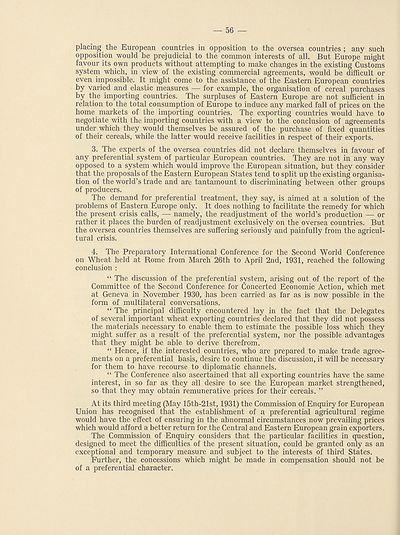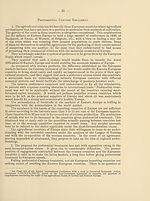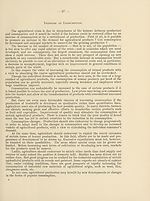Download files
Complete book:
Individual page:
Thumbnail gallery: Grid view | List view

56 —
placing the European countries in opposition to the oversea countries ; any such
opposition would be prejudicial to the common interests of all. But Europe might
favour its own products without attempting to make changes in the existing Customs
system which, in view of the existing commercial agreements, would be difficult or
even impossible. It might come to the assistance of the Eastern European countries
by varied and elastic measures — for example, the organisation of cereal purchases
by the importing countries. The surpluses of Eastern Europe are not sufficient in
relation to the total consumption of Europe to induce any marked fall of prices on the
home markets of the importing countries. The exporting countries would have to
negotiate with the importing countries with a view to the conclusion of agreements
under which they would themselves be assured of the purchase of fixed quantities
of their cereals, while the latter would receive facilities in respect of their exports.
3. The experts of the oversea countries did not declare themselves in favour of
any preferential system of particular European countries. They are not in any way
opposed to a system which would improve the European situation, but they consider
that the proposals of the Eastern European States tend to split up the existing organisa¬
tion of the world’s trade and are tantamount to discriminating between other groups
of producers.
The demand for preferential treatment, they say, is aimed at a solution of the
problems of Eastern Europe only. It does nothing to facilitate the remedy for which
the present crisis calls, — namely, the readjustment of the world’s production — or
rather it places the burden of readjustment exclusively on the oversea countries. But
the oversea countries themselves are suffering seriously and painfully from the agricul¬
tural crisis.
4. The Preparatory International Conference for the Second World Conference
on Wheat held at Rome from March 26th to April 2nd, 1931, reached the following
conclusion :
“ The discussion of the preferential system, arising out of the report of the
Committee of the Second Conference for Concerted Economic Action, which met
at Geneva in November 1930, has been carried as far as is now possible in the
form of multilateral conversations.
“ The principal difficulty encountered lay in the fact that the Delegates
of several important wheat exporting countries declared that they did not possess
the materials necessary to enable them to estimate the possible loss which they
might suffer as a result of the preferential system, nor the possible advantages
that they might be able to derive therefrom.
“ Hence, if the interested countries, who are prepared to make trade agree¬
ments on a preferential basis, desire to continue the discussion, it will be necessary
for them to have recourse to diplomatic channels.
“ The Conference also ascertained that all exporting countries have the same
interest, in so far as they all desire to see the European market strengthened,
so that they may obtain remunerative prices for their cereals. ”
At its third meeting (May 15th-21st, 1931) the Commission of Enquiry for European
Union has recognised that the establishment of a preferential agricultural regime
would have the effect of ensuring in the abnormal circumstances now prevailing prices
which would afford a better return for the Central and Eastern European grain exporters.
The Commission of Enquiry considers that the particular facilities in question,
designed to meet the difficulties of the present situation, could be granted only as an
exceptional and temporary measure and subject to the interests of third States.
Further, the concessions which might be made in compensation should not be
of a preferential character.
placing the European countries in opposition to the oversea countries ; any such
opposition would be prejudicial to the common interests of all. But Europe might
favour its own products without attempting to make changes in the existing Customs
system which, in view of the existing commercial agreements, would be difficult or
even impossible. It might come to the assistance of the Eastern European countries
by varied and elastic measures — for example, the organisation of cereal purchases
by the importing countries. The surpluses of Eastern Europe are not sufficient in
relation to the total consumption of Europe to induce any marked fall of prices on the
home markets of the importing countries. The exporting countries would have to
negotiate with the importing countries with a view to the conclusion of agreements
under which they would themselves be assured of the purchase of fixed quantities
of their cereals, while the latter would receive facilities in respect of their exports.
3. The experts of the oversea countries did not declare themselves in favour of
any preferential system of particular European countries. They are not in any way
opposed to a system which would improve the European situation, but they consider
that the proposals of the Eastern European States tend to split up the existing organisa¬
tion of the world’s trade and are tantamount to discriminating between other groups
of producers.
The demand for preferential treatment, they say, is aimed at a solution of the
problems of Eastern Europe only. It does nothing to facilitate the remedy for which
the present crisis calls, — namely, the readjustment of the world’s production — or
rather it places the burden of readjustment exclusively on the oversea countries. But
the oversea countries themselves are suffering seriously and painfully from the agricul¬
tural crisis.
4. The Preparatory International Conference for the Second World Conference
on Wheat held at Rome from March 26th to April 2nd, 1931, reached the following
conclusion :
“ The discussion of the preferential system, arising out of the report of the
Committee of the Second Conference for Concerted Economic Action, which met
at Geneva in November 1930, has been carried as far as is now possible in the
form of multilateral conversations.
“ The principal difficulty encountered lay in the fact that the Delegates
of several important wheat exporting countries declared that they did not possess
the materials necessary to enable them to estimate the possible loss which they
might suffer as a result of the preferential system, nor the possible advantages
that they might be able to derive therefrom.
“ Hence, if the interested countries, who are prepared to make trade agree¬
ments on a preferential basis, desire to continue the discussion, it will be necessary
for them to have recourse to diplomatic channels.
“ The Conference also ascertained that all exporting countries have the same
interest, in so far as they all desire to see the European market strengthened,
so that they may obtain remunerative prices for their cereals. ”
At its third meeting (May 15th-21st, 1931) the Commission of Enquiry for European
Union has recognised that the establishment of a preferential agricultural regime
would have the effect of ensuring in the abnormal circumstances now prevailing prices
which would afford a better return for the Central and Eastern European grain exporters.
The Commission of Enquiry considers that the particular facilities in question,
designed to meet the difficulties of the present situation, could be granted only as an
exceptional and temporary measure and subject to the interests of third States.
Further, the concessions which might be made in compensation should not be
of a preferential character.
Set display mode to:
![]() Universal Viewer |
Universal Viewer | ![]() Mirador |
Large image | Transcription
Mirador |
Large image | Transcription
Images and transcriptions on this page, including medium image downloads, may be used under the Creative Commons Attribution 4.0 International Licence unless otherwise stated. ![]()
| League of Nations > Economic and financial section > Agricultural crisis > Volume 1 > (58) |
|---|
| Permanent URL | https://digital.nls.uk/190903404 |
|---|
| Shelfmark | LN.II.2/2.(35) |
|---|---|
| Attribution and copyright: |
|
| Shelfmark | LN.II.2/2.(35-35) |
|---|---|
| Shelfmark | LN.II |
|---|
| Description | Over 1,200 documents from the non-political organs of the League of Nations that dealt with health, disarmament, economic and financial matters for the duration of the League (1919-1945). Also online are statistical bulletins, essential facts, and an overview of the League by the first Secretary General, Sir Eric Drummond. These items are part of the Official Publications collection at the National Library of Scotland. |
|---|---|
| Additional NLS resources: |
|

